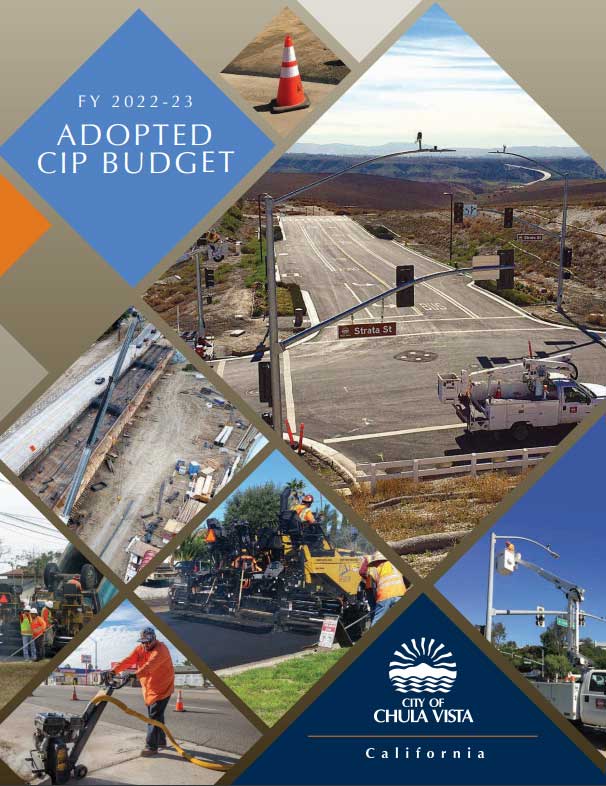The City of Chula Vista faces several infrastructure challenges that impact the daily lives of its residents. One of the main issues is the need to improve and maintain roads and transportation systems to accommodate the growing population and improve mobility. Additionally, the city’s aging water and sewer systems require significant investment to ensure reliable and efficient service. The city also faces challenges related to affordable housing and homelessness, which require investment in social services and infrastructure. Finally, the city must address the impacts of climate change, including sea-level rise and extreme weather events, on critical infrastructure, including roads and buildings. Overall, addressing these infrastructure challenges requires significant investment in the city’s transportation, water, housing, and emergency management systems to ensure long-term sustainability and resilience.

Sample Highlights from the Capital Improvement Plan
Project ID
Project Title
Project Start Year
Project Description
Project Spend Total
Page Ref
Project Satus
381631
RMRA Pavement Rehabilitation FY2022/23
2023
“Annual project includes pavement overlays and reconstruction of various streets in the City.
Rehabilitation treatments are based on the recommendations from the City’s Pavement Management
System. Project is funded by the Road Maintenance and Rehabilitation Account (RMRA)”
26455972
54
Ongoing
381655
ADA Pedestrian Push Button Improvements
2023
“This project will add accessible pedestrian push buttons at candidate City signalized intersections
identified in the Pedestrian Connectivity Plan.”
2000000
68
Ongoing
381660
Signal Improvements at 2 Locations and Jacqua Street Truck Access Control
2023
“Project will: add signalization for all movements at the intersection of East H St/Avila Wy; relocate
pedestrian crossing at Industrial Boulevard/Moss Street from north leg to south leg to reduce vehiclepedestrian conflicts and enhance pedestrian safety; and add access control measures on the end of
Jacqua Street to discourage truck traffic from passing through.”
900000
69
Ongoing
381665
Olympic Parkway Safety Enhancements
2023
“Striping modifications and improvements to signage and traffic signals that were identified in the
Olympic Parkway Road Safety Assessment at Town Center Drive and Eastlake Parkway as well as radar
speed feedback signs between Brandywine Avenue and La Media Road.”
700000
70
Ongoing
381667
Hilltop Drive SB-EB Left Turn Pocket Study
2023
“Traffic analysis to evaluate left turn pocket storage and traffic signal operations. FY23 funding to cover
study costs.”
300000
71
Ongoing
Explore all options available to you!
Citylitics offers access to over 30,000 unique locations across North America through our Capital Projects Dashboard (CPD).
Capital Projects Dashboard (CPD) provides a comprehensive market view of all planned infrastructure spend in one single view with powerful filters such as: population, project value, fiscal year, project status, project description, geography, and more. The dashboard will help identify opportunity hot spots, create data-driven forecasts you can be confident in with bottom-up data for the next 5 years of planned infrastructure spend, and uncover true market needs.
How to Read a Capital Improvement Plan (CIP) for Business Development?
When a city, municipality or state issues a Capital Improvement Plan (CIP), it can be overwhelming and daunting, but there are a few key things you need to investigate. Let’s start with the definition of CIP – A Capital Improvement Plan (CIP) contains all the individual capital projects, equipment purchases, and major studies for a local government; in conjunction with construction and completion schedules, and in consort with financing plans. The plan provides a working blueprint for sustaining and improving the community’s infrastructures. It coordinates strategic planning, financial capacity, and physical development. A CIP stands at the epicenter of a government’s Planning, Public Works, and Finance departments. When a CIP is issued, it typically includes the following information:
- A listing of the capital projects or equipment to be purchased
- The projects ranked in order of preference
- The plan for financing the projects
- A timetable for the construction or completion of the project
- Justification for the project
- Explanation of expenses for the project
Now, for business development, while the capital plan is interesting, the capital program is for capital expenditures that extends five to ten years beyond the capital budget. Knowing the difference is important so you can influence upcoming program versus just responding to an RFP. If reading the CIP makes your head explode, or you want to save time, Request a Demo of Citylitics CIP dashboard with over 20,000 CIPs from USA and Canada. Citylitics has 20,000 plus available CIPs, how can we help you? What states, cities or counties are you looking to improvement your business development, we can assist you in influencing an upcoming RFP versus simply responding to an RFP. Citylitics Capital Projects Dataset is a comprehensive resource for businesses and organizations looking to track and analyze planned infrastructure spend in their area. The dataset offers a range of features and benefits, including:
- Comprehensive Market View: The dataset provides a single view of all planned infrastructure spend, with powerful filters such as population, project value, fiscal year, project status, project description, geography, and more. This allows businesses to gain a comprehensive understanding of the market and identify new opportunities.
- Identify Opportunity Hot Spots: The dataset offers map views and filters that allow users to identify opportunity hot spots where they need to allocate resources. This helps businesses to understand where they should focus their efforts to achieve the best results.
- Create Data-Driven Forecasts: The dataset provides bottom-up data for the next 5 years of planned infrastructure spend, allowing businesses to create data-driven forecasts they can be confident in.
- Uncover True Market Needs: The dataset allows businesses to develop long-term business plans, R&D, and growth initiatives based on true, bottom-up market needs instead of opinions and anecdotes. This helps businesses to make more informed decisions and achieve better results.
With Citylitics Capital Projects Dataset, businesses can gain a deeper understanding of planned infrastructure spend in their area, which can help them to identify new opportunities and make more informed decisions.
